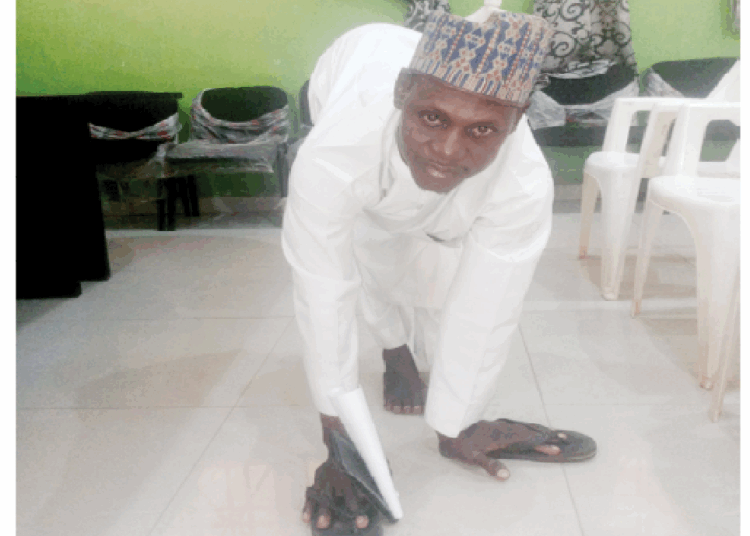Ibrahim Salihu Isa, a polio survivor, is the general manager of Alfijir Radio in Sokoto and the Internal Auditor of the Nigeria Union of Journalists (NUJ), Sokoto state council. In this interview with ADENIYI OLUGBEMI, he shares how he overcame physical challenges to build a successful career in journalism and inspire others through resilience and determination
Can you tell us a bit about your background and educational journey?
My name is Ibrahim Salihu Isa. I was born in Isa local government area of Sokoto State in 1983. I had both my elementary and secondary education in the same local government before relocating to Sokoto to further my studies. I attended Sokoto State Polytechnic, now known as Umaru Aliyu Shinkafi Polytechnic, where I obtained a Diploma in Mass Communication. Currently, I am pursuing a degree in Mass Communication at the National Open University of Nigeria (NOUN).
Were you born with disability, or did it occur later in life?
No, I was born normal like every other child and could walk on my legs. However, when I was one year and eight months old, I fell sick. It was later discovered that the illness was polio, which affected my ability to walk. Since then, I’ve never been able to walk on my legs.
Does that mean you didn’t receive the polio vaccine as a child?
Maybe, but I can’t say for certain because I was just a child at the time and unaware of whether I received the vaccine or not. All I was told was that I fell sick, and after recovering, I could no longer walk.
I’m the 11th child in the family, and none of my siblings were affected by polio. I grew up knowing my father as a caring businessman who prioritised the wellbeing of his family. He always ensured that anyone who fell sick received proper medical attention.
How were you able to cope with the rigours of attending school despite your disability?
I never saw my disability as a barrier. I was able to attend a primary school close to our house, thanks to my mother who carried me on her back to and from school during my first year. From my second year in primary school up to my polytechnic days, I was fortunate to have a locally fabricated tricycle, which helped with mobility.
Why did you stop using the tricycle?
I had to stop using the tricycle because of the stress involved. It’s not fast enough for me to move around unless I have access to a car, and there are many places I simply can’t reach with it. It’s also energy-sapping and difficult to maneuver, unlike an electric motorbike which would make movement much faster and easier, but unfortunately, I can’t afford one at the moment.
You must have experienced discrimination at some point. Can you recall any specific instances?
No doubt, I’ve faced what I would describe as challenges. Imagine not being able to walk to and from school or play freely like every other child.
However, two particular instances remain indelible in my memory.
The first was in primary six, when I was a member of my school’s quiz and debate team. We were en route to Sokoto to represent the Gwadabawa zone. Sadly, I was dropped from the team at the final stage, right there in Sokoto simply because of my disability. That discrimination hurt deeply.
The second experience, though initially a challenge, ended up shaping my future. After completing junior secondary school, I planned to attend a technical school with boarding facilities to ease the stress of commuting. But my family felt that taking care of myself in a boarding environment would be too demanding. As a result, I continued my senior secondary education as a day student.
It was during that period that I developed a strong interest in journalism. I joined the school’s press club and eventually became the Press Club Prefect in SSS 3. I thoroughly enjoyed the experience, and it inspired me to pursue journalism as a career.
My journalism journey began in 2010 after completing my diploma, when I joined the Sokoto State–owned Rima Radio as a casual staff member in the News and Current Affairs Department, where I served for five years. In 2015, I joined Vision FM as a staff member and Head of the Hausa Department. Then, in 2024, I became the General Manager of Alfijir Radio, where I currently serve.
What has journalism added to your life?
As I mentioned earlier, journalism wasn’t my first love. I originally planned to attend a technical school and become a technician. But looking back now, if there is life after this one, I would still choose journalism. It has changed my life and made me a better person.
Through journalism, I’ve had the opportunity to attend several trainings in Kaduna, Kano, and Abuja, where I acquired valuable knowledge. These trainings were organised by reputable organisations such as BBC Media Action, ActionAid, Search for Common Ground, Access International, Moving Images Ltd, and the Forum of International NGOs, among others.
Yes, I am happily married to my beautiful and able-bodied wife, and we are blessed with two children.
You’re living with a disability, and your wife is not. How did you win her heart?
Everyone gets married for different reasons, and our story is no different. Our marriage is very fulfilling because I am married to a lovely, able-bodied woman who loves me for who I am. We’re blessed with two wonderful children.
When she introduced me to her family, I expected some resistance, and yes, some family members initially showed resentment. But over time, she was able to win them over by standing her ground and insisting that I was the man she wanted to marry.
As a polio survivor, how involved are you in advocacy against the disease?
I’m actively involved in advocacy. I currently serve as the Zonal Coordinator of the Joint National Association of People Living with Disabilities in Sokoto East. We meet regularly to discuss issues affecting our members, and most of us serve as role models especially for students living with disabilities.
I’ve participated in almost every advocacy campaign related to polio eradication in my region. One of our main focuses has been sensitising parents about the importance of polio immunisation. The government, in collaboration with traditional institutions, has also done well in mobilising and educating mothers on the need to present their children for vaccination.





